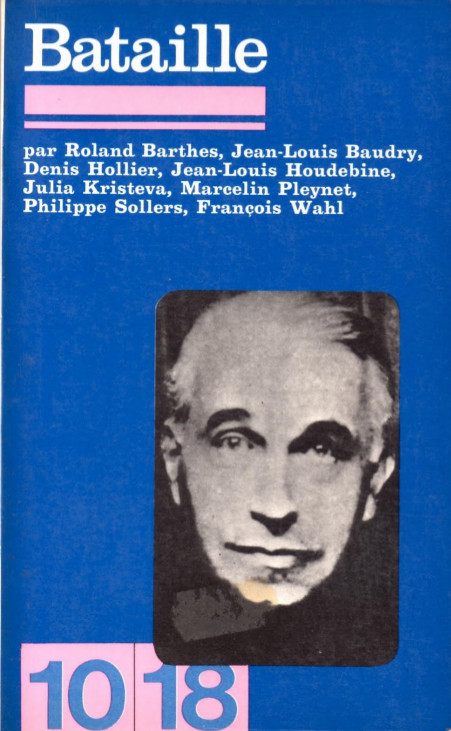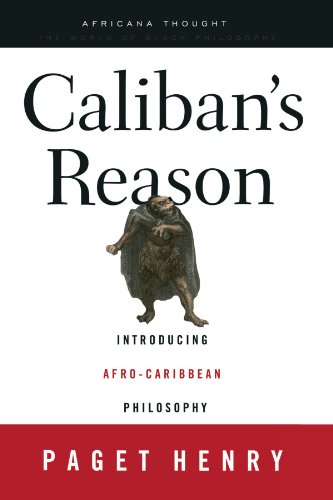Philippe Sollers (ed.): Bataille (1973) [French]
Filed under book | Tags: · philosophy

Proceedings of a conference held June 29-July 9, 1972 at the Centre culturel international de Cerisy-la-Salle, with contributions by Roland Barthes, Jean-Louis Baldry, Denis Hollier, Jean-Louis Houdebine, Julia Kristeva, Marcelin Pleynet, Philippe Sollers, François Wahl, a.o.
Publisher Union générale d’éditions, Paris, 1973
10/18 series, 805
318 pages
via lostobserver
PDF (18 MB)
Comment (1)Paget Henry: Caliban’s Reason: Introducing Afro-Caribbean Philosophy (2000)
Filed under book | Tags: · africa, caribbean, colonialism, consciousness, epistemology, existentialism, historicism, history of philosophy, knowledge, marxism, ontology, philosophy, poeticism, poststructuralism

“Caliban’s Reason introduces the general reader to Afro-Caribbean philosophy.
In this ground-breaking work, Paget Henry traces the roots of this discourse in traditional African thought and in the Christian and Enlightenment traditions of Western Europe. Since Afro-Caribbean thought is inherently hybrid in nature and marked by strong competition between its European and African orientations, Henry highlights its four main influences–traditional African philosophy, the Afro-Christian school, Poeticism and Historicism–as his organizing principle for discussion.
Offering a critical assessment of such writers as Wilson Harris, Derek Walcott, Edward Blyden, C.L.R. James and George Padmore, Caliban’s Reason renders a much-needed portrait of Afro-Caribbean philosophy and fills a significant gap in the field.”
Publisher Routledge, 2000
Africana Thought series
ISBN 0415926459, 9780415926454
xiii+304 pages
Reviews: H. Adlai Murdoch (SubStance, 2002), Claudette Anderson (Small Axe, 2002), Charles Mills (Phil Review, 2003), Clevis Headley (Int’l J of African Hist Studies, 2003), Leslie R. James (North Star, 2004).
Interview with author (Linda Martín Alcoff, 2003)
Comment (0)Computational Culture, 5: Rhetoric and Computation (2016)
Filed under journal | Tags: · algorithm, code, computation, language, machine, philosophy, rhetoric, semantics, software studies, theory
“How can machines be rhetorical? The readers of Computational Culture need not be convinced that computation drives the digital and networked spaces in which we interact, argue and communicate: word processing programs, videogames, banking and commerce systems, social networking sites, and smartphone apps that track our data (both with and without our knowledge) are all evidence that computation in code shapes nearly every space we inhabit. Computation in code affects and effects our lives. Computational machines affect us through their programming and design, as well the discourse they can generate, via text, image, sound, and so on. By writing computer code and software, programmers and designers construct machines that make arguments and judgments and address audiences both machinic and human. In this sense, even the most mundane computational technologies can be seen as rhetorical –from the grocery store check-out scanner to the high school graphing calculator–because any computational machine shapes and constrains behavior. […]
Software studies has paved the way for many disciplines to approach software as an object of study and computer programs as written artifacts, and we may add rhetoric to our toolkit to do so. We can use rhetoric to interpret the ways that computation addresses and responds to various audiences and exigencies, makes assertions about identities, and ultimately participates in a complex ecology of forces that shape behavior and perception. This version of rhetoric is more expansive than the limited, Aristotelian definition rhetoric as the ‘available means of persuasion.’ Just as software studies recognizes that software is more than code, and that code is more than ones and zeros, contemporary rhetoric is interested in more than the content of arguments; it also concerns the relational forces that precede and exceed arguments.” (from the introduction)
With thematic texts by Steve Holmes, John Tinnell, Kevin Brock, Elizabeth Losh, Jennifer Maher, Alexander Monea, Andreas Birkbak & Hjalmar Bang Carlsen, Matthew Bellinger; articles by M. Beatrice Fazi, Erica Robles-Anderson and Patrik Svensson, Michael Lachney, William Babbitt & Ron Eglash, and review section.
Edited by Annette Vee and James J. Brown, Jr.
Published in January 2016
Open Access
ISSN 2047-2390

